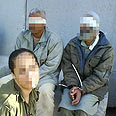
IDF's Facebook dilemma
Many soldiers post personal content online with very little regard for potential harm to IDF's image
The images of young female soldier Eden smiling next to bound Palestinian detainees, which were posted on Facebook, evoked fury on the social networking site as well as on Twitter. The pictures were posted earlier this month, and were exposed by the media on Monday.
Many users responded with shock and outrage to the pictures posted by the former soldier, who since then has been discharged from the Israel Defense Forces. The anger came in response not only to the fact that the demeaning photos were posted, but also in response to the soldier's cavalier attitude toward the situation in which they were taken, which could be perceived in her comments to the pictures (many of which included the words "ha ha").
Social networking has become an open stage for a variety of content, flaunted without any real supervision or regulation. Because of this, users allow themselves to post loaded and offensive images freely.
Many young web-surfers, including soldiers and former soldiers, are not aware of privacy issues or other sensitive subjects the content they upload raises. For them, it's better to post as much as possible, expose the world to what interests them, to what they love, and the experiences they go through in life. For them, online exposure is a second nature. Eden's album has other pictures from her military service, without any detainees.

Facebook picture of Eden with Palestinian detainees
The web is full of tools for users to express their every thought: Mini-blogs like Twitter, online photo albums on websites such as Flickr, videos on YouTube and, of course, Facebook, which combines all these. The soldier uploaded her album some two weeks ago, and called it – "Army…best time of my life :)" – and she may have meant just that.
From her perspective, the former soldier didn't even understand why she did anything wrong, or what her assailants want from her. One web-user who politely addressed her and asked her why she uploaded the photos got the response, "I don't understand why it's your business to go through soldiers' Facebooks and always look for the bad. Deal with more important things."
After her pictures were published outside her private album, the soldier blocked strangers' access to her Facebook profile.
'Just a funny thing that happened in the army'
It seems this is a widespread phenomenon: Many soldiers take pictures or film video clips during army operations in regular and reserve service. They believe this is simply the documentation of personal experiences, which they wish to share with their friends and the world.
They seem to be aware of the level of exposure the content they upload to Facebook receives – but are simply not troubled by it. This year we encountered another display of content harmful t the IDF's image – the video of the dancing Nahal Brigade soldiers in Hebron.
This video was preceded by quite a few pictures and videos "innocently" taken by soldiers and uploaded. This video shows a Border Guard officer making Palestinian children dance from across the separation fence:
This video shows Palestinian children "storming and shooting" with Border Guard berets on their heads. They are followed by soldiers, who film them and instruct them on how to carry out the mission properly. At the end of the video, one of the children stands in front of the camera and says he loves the Border Guard:
Such a video could evoke empathy, as it shows soldiers and children playing together. However, it's also easy to regard it as a cynical and offensive clip, which has the potential to hurt the military's image. The user who uploaded the video apparently didn't even consider this. For him, it was just a "funny thing that happened to me in the army."
In contrast, the next video shows a particularly upsetting image, of soldiers holding a bound "terrorist" in their tent and mocking his language and accent:
If in the past such images were exposed due to leaks from different sources, as was the case with the photos of American soldiers abusing detainees at the Abu Ghraib prison in Iraq, it seems now, the "abusers" themselves could actually be the ones posting such images.
Policies on exposing content on the internet range from meticulous regulation of everything the user puts up to full and almost unlimited exposure. Young soldiers who upload such pictures don't do it out of a political agenda, protest or rebellion against the system; they do it because it's important to them to share their experiences with their friends, and they are not consciously aware of the consequences of their actions.
National and operational repercussions
The young soldiers' personal policies have fr-reaching repercussions at times. In March of this year, the IDF called off an operation in the West Bank due to information leaked on Facebook. It was an innocent leak: A soldier mentioned the information in his status on the social network.
It seems the IDF is taking measures to stress the importance of securing information on social networking sites. In the past, IDF bases were plastered with posters the read: "Not everyone is your friend on Facebook". Still, it seems the military has not yet found the right formula to instill in its soldiers awareness of the sensitivity of other content they may post online.
PR and instructions may prevent the reoccurrence of similar cases. Meanwhile, it is important to remember that exposing personal details is common among many teenagers in Israel, and the defense establishment must fine tune its data protection protocols not only pertaining to operational matters, but also with regards to "buddy pictures".
- Follow Ynetnews on Facebook










